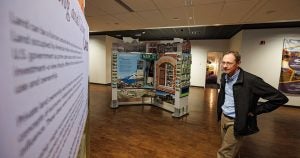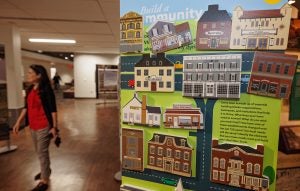Reception, video about Crossroads
The Janice Hardison Faulkner Gallery on the second floor of the main campus library hosted the traveling exhibit, “Crossroads: Change in Rural America,” in October and November.

David Hisle looks at part of the Smithsonian Crossroads exhibit in the Janice Hardison Faulkner Gallery gallery.
In conjunction with North Carolina Humanities, “Crossroads: Change in Rural America” is a Smithsonian Institution exhibit that offers small towns and rural communities a chance to look at their own paths to highlight the changes that affected their fortunes during the past century. The exhibit explores how rural America embraces the notion that citizens and their cultural uniqueness are important assets.
ECU was one of the six North Carolina venues chosen as a host. WATCH: YouTube video about eastern North Carolina and Crossroads.
Reception event
A reception held Nov. 3 featured insight and remarks by Dr. Misun Hur, ECU associate professor and director of the community and regional planning program, and Association of Mexicans in North Carolina (AMEXCAN) executive director Juvencio Rocha-Peralta.

Hur’s address to attendees included the presentation of various research data points, including geography maps and graphs, about the history and changes in demographics of rural areas in North Carolina and across the country. Hur also provided examples of poor living conditions and isolation that sometimes occurs, emphasizing that, “Quality of life and mental health all ties together” in agriculture.
Rocha-Peralta discussed personal insight about his experiences in eastern North Carolina and the hope that change can lead to more positive interactions in the future.
“I think having these conversations, we see that rural North Carolina is really changing,” said Rocha-Peralta, who migrated to North Carolina in Duplin County when he was a teenager. “I think it’s time for us now to embrace the population, because the changes are going to continue. For the past 10 years in North Carolina, the Latino population has grown 40 percent faster than any other state in the country. … Change in rural North Carolina is a natural thing that’s going to happen, and somehow we’ve got to embrace it.”
